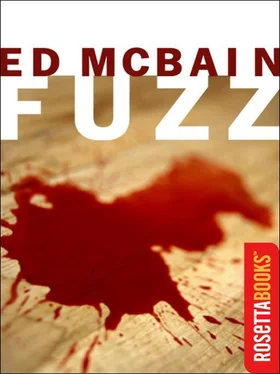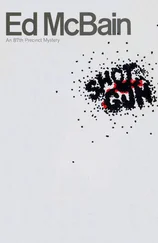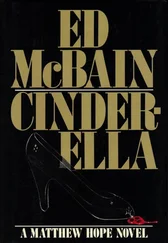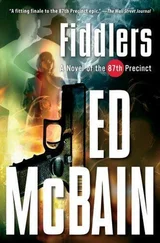Ed Mcbain - Fuzz
Здесь есть возможность читать онлайн «Ed Mcbain - Fuzz» весь текст электронной книги совершенно бесплатно (целиком полную версию без сокращений). В некоторых случаях можно слушать аудио, скачать через торрент в формате fb2 и присутствует краткое содержание. Жанр: Полицейский детектив, на английском языке. Описание произведения, (предисловие) а так же отзывы посетителей доступны на портале библиотеки ЛибКат.
- Название:Fuzz
- Автор:
- Жанр:
- Год:неизвестен
- ISBN:нет данных
- Рейтинг книги:3 / 5. Голосов: 1
-
Избранное:Добавить в избранное
- Отзывы:
-
Ваша оценка:
- 60
- 1
- 2
- 3
- 4
- 5
Fuzz: краткое содержание, описание и аннотация
Предлагаем к чтению аннотацию, описание, краткое содержание или предисловие (зависит от того, что написал сам автор книги «Fuzz»). Если вы не нашли необходимую информацию о книге — напишите в комментариях, мы постараемся отыскать её.
Fuzz — читать онлайн бесплатно полную книгу (весь текст) целиком
Ниже представлен текст книги, разбитый по страницам. Система сохранения места последней прочитанной страницы, позволяет с удобством читать онлайн бесплатно книгу «Fuzz», без необходимости каждый раз заново искать на чём Вы остановились. Поставьте закладку, и сможете в любой момент перейти на страницу, на которой закончили чтение.
Интервал:
Закладка:
“Yes, but what’s his name?”
“We don’t know his name. We never caught him. He jumped in the river and we thought he drowned, but maybe he’s back now. Like Frankenstein.”
“Like Frankenstein’s monster, you mean,” Cindy said.
“Yeah, like him. Remember he was supposed to have died in that fire, but he didn’t.”
“I remember.”
“That was a scary picture,” Kling said.
“I wet my pants when I saw it,” Cindy said. “And that was on television.”
“You wet your pants on television? ” Kling said. “In front of forty million people? ”
“No, I saw Frankenstein on television,” Cindy said, and grinned and poked him.
“The deaf man,” Kling said. “I hope it’s not him.”
It was the first time any man on the squad had voiced the possibility that the commissioner’s murderer was the man who had given them so much trouble so many years ago. The thought was somewhat numbing. Bert Kling was a young man, and not a particularly philosophical one, but he intuitively understood that the deaf man (who had once signed a note L. Sordo, very comical, El Sordo meaning “The Deaf One” in Spanish) was capable of manipulating odds with computer accuracy, of spreading confusion and fear, of juggling permutations and combinations in a manner calculated to upset the strict and somewhat bureaucratic efficiency of a police precinct, making law enforcers behave like bumbling Keystone cops in a yellowing ancient film, knew instinctively and with certainty that if the commissioner’s murderer was indeed the deaf man, they had not yet heard the end of all this. And because the very thought of what the deaf man might and could do was too staggering to contemplate, Kling involuntarily shuddered, and he knew it was not from the cold.
“I hope it isn’t him,” he said, and his words were carried away on the wind.
“Kiss me,” Cindy said suddenly, “and then buy me a hot chocolate, you cheapskate.”
The boy who came into the muster room that Wednesday afternoon was about twelve years old.
He was wearing his older brother’s hand-me-down ski parka which was blue and three sizes too large for him. He had pulled the hood of the parka up over his head, and had tightened the drawstrings around his neck, but the hood was still too big, and it kept falling off. He kept trying to pull it back over his head as he came into the station house carrying an envelope in the same hand with which he wiped his runny nose. He was wearing high-topped sneakers with the authority of all slum kids who wear sneakers winter and summer, all year round, despite the warnings of podiatrists. He walked to the muster desk with a sneaker-inspired bounce, tried to adjust the parka hood again, wiped his dripping nose again, and then looked up at Sergeant Murchison and said, “You the desk sergeant?”
“I’m the desk sergeant,” Murchison answered without looking up from the absentee slips he was filling out from that morning’s muster
sheet. It was 2:10 P.M., and in an hour and thirty-five minutes the afternoon shift of uniformed cops would be coming in, and there’d be a new roll call to take, and new absentee slips to fill out, a regular rat race, he should have become a fireman or a postman.
“I’m supposed to give you this,” the kid said, and reached up to hand Murchison the sealed envelope.
“Thanks,” Murchison said, and accepted the envelope without looking at the kid, and then suddenly raised his head and said, “Hold it just a second.”
“Why, what’s the matter?”
“Just hold it right there a second,” Murchison said, and opened the envelope. He unfoled the single sheet of white paper that had been neatly folded in three equal parts, and he read what was on the sheet, and then he looked down at the kid again and said, “Where’d you get this?”
“Outside.”
“Where?”
“A guy gave it to me.”
“What guy?”
“A tall guy outside.”
“Outside where?”
“Near the park there. Across the street.”
“Gave you this?”
“Yeah.”
“What’d he say?”
“Said I should bring it in here and give it to the desk sergeant.”
“You know the guy?”
“No, he gave me five bucks to bring it over here.”
“What’d he look like?”
“A tall guy with blond hair. He had a thing in his ear.”
“What kind of a thing?”
“Like he was deaf,” the kid said, and wiped his hand across his nose again.
That was what the note read.
So they studied the note, being careful not to get any more fingerprints on it than Sergeant Murchison had already put there, and then they stood around a runny-nosed twelve-year-old-kid wearing a blue ski parka three sizes too large for him, and fired questions at him as though they had captured Jack the Ripper over from London for the weekend.
They got nothing from the kid except perhaps his cold.
He repeated essentially what he had told Sergeant Murchison, that a tall blond guy wearing a thing in his ear (A hearing aid, you mean, kid?) yeah, a thing in his ear, had stopped him across the street from the police station and offered him five bucks to carry an envelope in to the desk sergeant. The kid couldn’t see nothing wrong with bringing an envelope into the police station, so he done it, and that was all, he didn’t even know who the guy with the thing in his ear was. (You mean a hearing aid kid?) Yeah, a thing in his ear, he didn’t know who he was, never even seen him around the neighborhood or nothing, so could he go home now because he had to make a stop at Linda’s Boutique to pick up some dresses for his sister who did sewing at home for Mrs. Montana? (He was wearing a hearing aid, huh, kid?) Yeah, a thing in his ear, the kid said.
So they let the kid go at two-thirty without even offering him an ice cream cone or some gumdrops, and then they sat around the squadroom handling the suspect note with a pair of tweezers and decided to send it over to Lieutenant Sam Grossman at the police lab in the hope that he could lift some latent prints that did not belong to Sergeant Murchison.
None of them mentioned the deaf man.
Nobody likes to talk about ghosts.
Or even think about them.
“Hello, Bernice,” Meyer said into the telephone, “is your boss around? Yeah, sure, I’ll wait.”
Patiently, he tapped a pencil on his desk and waited. In a moment, a bright perky voice materialized on the line.
“Assistant District Attorney Raoul Chabrier,” the voice insisted.
“Hello, Rollie, this is Meyer Meyer up here at the 87th,” Meyer said. “How’s every little thing down there on Chelsea Street?”
“Oh, pretty good, pretty good,” Chabrier said, “What have you got for us, a little homicide up there perhaps?”
“No, nothing like that, Rollie,” Meyer said.
“A little ax murder perhaps?” Chabrier said.
“No, as a matter of fact, this is something personal,” Meyer said.
“Oh- ho! ” Chabrier said.
“Yeah. Listen, Rollie, what can you do if somebody uses your name?”
“What do you mean?” Chabrier asked.
“In a book.”
“Oh- ho! “ Chabrier said. “Did somebody use your name in a book?”
“Yes.”
“In a book about the workings of the police department?”
“No.”
“Were you mentioned specifically?”
“No. Well, yes and no. What do you mean?”
“Did the book specifically mention Detective 3rd/Grade Meyer …”
“Detective 2nd /Grade,” Meyer corrected.
“It specifically mentioned Detective 2nd/Grade Meyer Meyer of the …”
“No.”
“It didn’t mention you?”
“No. Not that way.”
Читать дальшеИнтервал:
Закладка:
Похожие книги на «Fuzz»
Представляем Вашему вниманию похожие книги на «Fuzz» списком для выбора. Мы отобрали схожую по названию и смыслу литературу в надежде предоставить читателям больше вариантов отыскать новые, интересные, ещё непрочитанные произведения.
Обсуждение, отзывы о книге «Fuzz» и просто собственные мнения читателей. Оставьте ваши комментарии, напишите, что Вы думаете о произведении, его смысле или главных героях. Укажите что конкретно понравилось, а что нет, и почему Вы так считаете.












